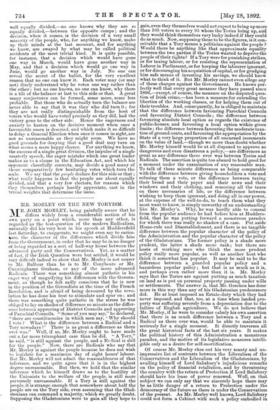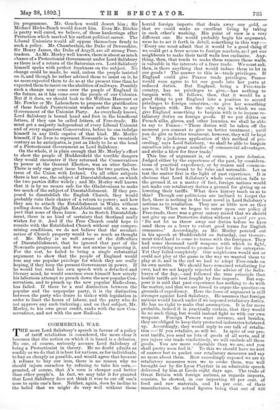MR. MORLEY ON THE NEW TORYISM.
AIR. JOHN MORLEY, being painfully aware that he differs widely from a considerable section of his own party on a point which, more than any other, is regarded as the test-question of the modern Radicalism, naturally did his very best in his speech at Huddersfield last Saturday, to exaggerate, we might even say to carica- ture, the character of the differences which divide him from the Government, in order that he may be in no danger of being regarded as a sort of half-way house between the advanced party and the Conservatives. Yet, as a matter of fact, if the Irish Question were but settled, it would be very difficult indeed to show that Mr. Morley is not nearer to Mr. Balfour than he is to Mr. Cony beare or Mr. Cunninghame Graham, or any of the more advanced Radicals. There was something almost pathetic in his eager way of magnifying his differences with the Govern- ment, as though he felt sadly conscious that he is now in the position of the Girondists at the time of the French Revolution, and is afraid of being devoured by the revo- lution he has done his best to stimulate and spur on ; and there was something quite pathetic in the stress he was obliged to lay on shades of difference so minute as the differ- ence between approving of District Councils and approving of Parochial Councils. "Some of you may say," he declared, "there are constituencies in which men say, Why should I vote ? What is the difference between a Radical and a Tory nowadays ?' There is as great a difference as there ever was." Well, if so, Mr. Morley ought to have made out a far more triumphant case than he did. "A Tory," he said, "is still against the people, and a Radical is still for the people." Now, there are Radicals who say that Mr. Morley is against the people because he does not wish to legislate for a maximum day of eight hours' labour. But Mr. Morley will not admit the reasonableness of that inference, and we quite agree that it is in the highest degree unreasonable. But then, we hold that the similar inference which he himself draws as to the hostility of the Unionists to the welfare of the people, is still more perversely unreasonable. If a Tory is still against the people, it is strange enough that somewhere about half the people are on the Tory side, even assuniing that the Glad- stonians can command a majority, which we greatly doubt. Supposing the Gladstonians were to gain all they hope to gain, even they themselves would not expect to bring up more than 105 voters to every 95 whom the Tories bring up, arid they would think themselves very lucky indeed if they could do as much. Now, supposing these to be the figures, is it con- ceivable that a Tory means a politician against the people ? Would there be anything like that approximate equality between the two parties if the Tories wanted to deprive the people of their rights? If a Tory were for punishing strikes, or for taxing labour, or for resisting the representation of Labour in Parliament, or for keeping the labourer ignorant, or for discouraging his acquisition of capital, or for grudging him safe means of investing his savings, we should know what to think of it. But Mr. Morley cannot even allege any of these charges against the Government. He knows per- fectly well that every great measure they have passed since 1886,—except, of course, the measure on the disputed ques- tion of Irish crime,—has been a measure for extending the liberties of the working classes, or for helping them out of their troubles. And, consequently, he is obliged to maintain that the difference between favouring Parochial Councils and favouring District Councils ; the difference between favouring absolute local option as regards the existence of public-houses, and favouring a local option within given limits ; the difference between favouring the moderate taxa- tion of ground-rents, and favouring the appropriation by the State of a very large proportion of all unearned increments on the value of land,—though we more than doubt whether Mr. Morley himself would be at all disposed to approve so dangerous and even disastrous a policy,—are differences as great as any difference there ever was between Tories and Radicals. The assertion is quite too absurd to hold good for a moment under the examination of any reasonable man. To talk of these minute differences as being comparable with the difference between giving householders a vote and refusing them a vote, or the difference between taxing their bread and their paper and their news and their windows and their clothing, and removing all the taxes on these necessaries of life, or the difference between wishing to keep them ignorant, and doing all in our power, at the expense of the well-to-do, to teach them what they most want to know, is simply unworthy of an understanding like Mr. Morley's. Why, he was hardly able to conceal from the popular audience he had before him at Hudders- field, that he was putting forward a monstrous paradox for which there was really no shadow of a case. Put aside Home-rule and Disestablishment, and there is no tangible difference between the popular character of the policy of the Administration and the popular character of the policy of the Gladstonians. The former policy is a shade more prudent, the latter a shade more rash ; but there are hosts of working men who think the more prudent policy really more popular, as well as another host who think it somewhat less popular. It may be said to be the difference between a guarded popular policy and a hazardous popular policy ; but that is as much as it is, and perhaps even rather more than it is. Mr. Morley says that the Tories are against putting as much taxation on land as is put on personal property passing under wills or settlements. The answer is, that Mr. Goschen has done more in this way than any of his Gladstonian predecessors did. He at least imposed an Estate-duty which they had never imposed, and that, too, at a time when landed pro- perty was suffering severely from a depreciation due to the failure of English agriculture. We do not believe that Mr. Morley, if he were to consider calmly his own assertion that there is as much difference between a Tory and a Radical as there ever was, would be able to maintain it seriously for a single moment. It directly traverses all the great historical facts of the last six years. It makes the political history of this Administration a monstrous paradox, and the motive of its legislative measures intelli- gible only as a desire for self-mortification.
Of course Mr. Morley ekes out his very scanty and un- impressive list of contrasts between the Liberalism of the Conservatives and the Liberalism of the Gladstonians, by availing himself of Lord Salisbury's injudicious remarks on 'the policy of financial retaliation, and by threatening the country with the return of Protection if Lord Salisbury should have his lease of power renewed. Well, on that subject we can only say that we sincerely hope there may be as little danger of a return to Protection under the democracy of the future as there is under the Conservatism of the present. As Mr. Morley well knows, Lord Salisbury could not form a Cabinet with such a policy embodied in its programme. Mr. Goschen. would desert him ; Sir Michael Hicks-Beach would desert him. Even Mr. Ritchie is pretty well cured, we believe, of those hankerings after Protection which marked his earliest political career. The Liberal Unionists would all oppose themselves firmly to such a policy. Mr. Chamberlain, the Duke of Devonshire, Sir Henry James, the Duke of Argyll, are all strong Free- traders. As Mr. Morley well knows, there is about as much chance of a Protectionist Government under Lord Salisbury as there is of a return of the Saturnian era. Lord Salisbury himself spoke with perfect frankness on the subject. No change could be made, he said, unless the people insisted on it, and though he rather advised them to insist on it, he no more expected them to do so at the present time than he expected them to insist on the abolition of railways. Possibly such a change may come over the people of England in the future, as it has come over the people of our Colonies. But if it does, we should look to Sir William Harcourt or Mr. Fowler or Mr. Labouchere to propose the gratification of these foolish Protectionist wishes rather than to any Government of the Unionist Party. As everybody knows, Lord Salisbury is bound hand and foot in the beneficent fetters, if they can be called fetters, of Free-trade. He must get a majority independent of every Liberal Unionist and of every sagacious Conservative, before be can indulge himself in any little caprice of that kind. Mr. Morley himself, if he lives to represent Newcastle in the twentieth century as he anticipates, is just as likely to be at the head of a Protectionist Government as Lord Salisbury.
On the whole, it is plain enough that Mr. Morley's effort to show the people of Huddersfield the terrible dangers they would encounter if they returned the Conservatives to power at the General Election, was an utter failure. There is only one great issue between the two parties, the issue of the Union with Ireland. On all other subjects there is but one, the subject of Disestablishment, on which the two parties differ widely ; and Mr. Morley well knows that it is by no means safe for the Gladstonians to make too much of the subject of Disestablishment. If they pro- posed to disestablish the English Church, they would probably ruin their chance of a return to power; and how they are to attack the Establishment in Wales without pulling down the English Establishment with it, we sus- pect that none of them know. As to Scotch Disestablish- ment, there is no kind of certainty that Scotland really wishes for it. And if the Free Church could hope to reunite with the Established Church without any compro- mising conditions, we do not believe that the seculari- sation of Church property would be so much as thought of. Mr. Morley is so well aware of the difficulties of Disestablishment, that he ignored that part of the Newcastle programme, and was not unwise in ignoring it. For the rest, he failed to bring a single substantial argument to show that the people of England would lose any one popular privilege for which they are really hoping, if they keep the present Government in power. If he would but read his own speech with a detached and literary mind, he would convince even himself how utterly his laborious attempt to preach down the new popular Con- servatism, and to preach up the new popular Radicalism, has failed. If there be a real distinction between the popular and the unpopular party, it is the distinction between the party who desire to tinker with legislation in order to limit the hours of labour, and the party who do not approve any such tinkering; and on that subject, Mr. Morley, to his own great credit, ranks with the new Con- servatives, and not with the new Radicals.







































 Previous page
Previous page